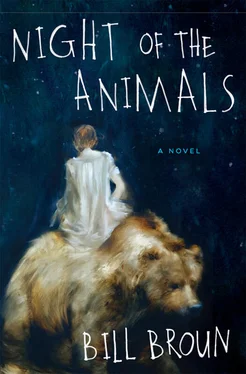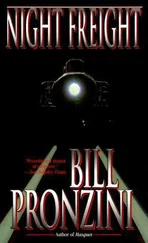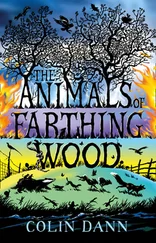Britain’s dogs had much to say, too: a Seeing Eye Labrador on a bosonicabus *had told Cuthbert that invisible grid lines crisscrossed every pavement, street, house, New Tube, or bosonicabus entrance in the city. From its point of view, London was impeccably Pythagorean and soothing. A wirehaired fox terrier, on the other hand, who yelped behind a wooden gate that Cuthbert often passed in Islington, would shrill with impish pep, Happyfury! Happyfury! Happyfury! Cuthbert did not know what it meant — but he believed it.
And on and on they went, voices from across Albion. The black-eyed ponies of the New Forest wanted larger pastures. The fat gray seals off the Isles of Scilly wanted cleaner breeding waters. That autumn, down from the craggy Black Carls of Beinn Eighe came the angry voices of red deer stags in rut, barking for sex. Then there were Britain’s forty million head of sheep, and each head, Cuthbert suspected, had a gentle idea of its own.
All these animals didn’t talk to him exactly, not like Virginia Woolf’s Greek-uttering birds or Kipling’s noble, contraction-averse wolves. Words did not pass through snout, proboscis, or mandible. But nonetheless, the animals asserted themselves toward him. They sent messages, some limpid, some inscrutable, but all appreciable. Some were preverbal, others expressive and exact. Most were enigmatic — but they all nipped at him, if only just a little.
They spoke so tersely, too. Often the zoo animals imparted just one or two expressive words. “ Saliq, ” the sand cats would whisper. “Murkurk,” rumbled the hippos. “Progress and dominion,” the imperial — and often verbose — lions would intone, and so on. On more and more days, these occult reductions popped into perfect sense within Cuthbert. For example, murkurk, as Cuthbert grasped it, clearly meant “let the hippopotamus make its way to the Thames.” He’d think: how much clearer could it be?
HE LIFTED UP a tangle of the thin, elastic branches in the hedge with his arm, spun around, and tried backing in. He needed to make sure no one was watching. He felt he could not be more prepared for today, considering his circumstances. He’d put on his black weather-buffer and green trousers for cover. He wore the hood on the buffer, and cinched it tight around his swarthy face. He looked like a big, dark Teletubby from the old TV program — a new one, Boozey, with a smashed television screen on its tummy and two purple Flōt bottle-tops for eyes.
Getting to this secret spot, a maneuver he had practiced twice that week, seemed far more difficult this evening; he felt as if he were crawling under a duvet stuffed with plaited, stinging sticks. He had ducked and shoved in, stolid and elephantine, but come to a real sticking spot. He must move fast. If a passer-by spotted him — a fat man splayed in the hedges — undoubtedly a commotion would ensue. If that happened, everything ended. His grand plan to free all the animals would die.
It was with this realization that something truly unaccountable appeared before Cuthbert, within the hedges. All at once, a broad and robust figure, in the shadows of the leaves and branches, crept upon him. A nimbus of golden-green air surrounded him. Cuthbert began to quake in terror, his neck hair standing on end.
“You!” cried Cuthbert. “You there!”
The figure seemed to have actually sprouted from the ground within the hedges, a massive yew tree dotted with angry red berries. For a moment, it spumed in all directions, chaotically, a flutter of spinning green boughs with handfuls of black soil and nightlarks and tiny owls bursting from it. A multitude of small, dark animals — they resembled hares made of shadow — poured out from its base and took off into the night air, where they dissolved. The great yew-tree figure moved toward Cuthbert, who could barely breathe, such was his dread.
“What do you want from me?” he asked.
The figure replied, “ Gagoga .” The voice was unlike all the other animals he had been hearing. This one was familiar, yet oddly muffled. It was like code from some enormous forest, a code spoken from beneath one of its deepest, darkest brooks.
Cuthbert whispered, “Drystan?”
the depraved practitioner
CUTHBERT’S GENERAL PRACTITIONER, DR. SARBJINDER Singh Bajwa, to whom he had grown quite close in the previous months, and who had tried so hard to protect Cuthbert from himself, surely would have started tapping his middle finger on his desk the way he did if he were observing all this.
Of the small cadre of harried NHS Élite GPs who administered to the poor in the All-Indigent zone around Holloway, the locals considered Dr. Bajwa especially long-suffering and kind, and because of this, he was in mortal danger. When it came to the treatment of Indigents, the new aristocracy brutally rooted out softness. Indeed, compassion (in anyone other than King Henry) was considered a form of depravity.
But Dr. Bajwa loved on — and in so many degenerate ways — and as far as he was concerned, the regime could top itself. He was well known for his adoration of paper and his unnecessary reminders written in ink on passé sticky notes. He was always handing these to his patients, despite the dozens of Opticalls — the catchall name for audio calls, text messages, and Optispam, sent via WikiNous’s neuro-optical interface — his patients automatically received with every consult. Few, apart from Cuthbert, knew that beneath the quiet, tolerant, papyrophilic surface of the doctor lurked a more swaggering personality.
Over the previous six months, and well before Cuthbert had got himself stuck beside a green phantom in the hedges, the doctor had developed feelings of both duty and bewilderment when it came to the welfare of this particular addict. Here was a tough old Flōt sot who also showed signs of depersonalization disorder as well as, perhaps, a variety of Cotard’s Syndrome (a delusion in which a patient was convinced she or he is dead). He was, among other things, interesting to Dr. Bajwa. And impossible.
Cuthbert had spoken to him many times about his delusion of animal telepathy, and Dr. Bajwa, or “Baj,” as friends and regulars called him, would invariably fiddle his fingers, grimace, and proffer one of his beloved English idioms. The doctor was quadralingual, with English, as he saw it, the strangest of the four tongues, but he loved how its scores of idioms put splattering city life into tidy, confident boxes. “I see you’ve really grasped the nettle this time,” he sometimes said to Cuthbert, usually with an expansive grin.
THE REVELATIONS ABOUT Cuthbert’s animals had begun one morning the previous October. He had been telling Baj about a shambling stroll he’d just taken in Regent’s Park, which encased three sides of the zoo. He’d been stoned on Flōt, as usual, walking on skyscraper legs.
It was, as it happened, the day of the last performance of the season at the park’s Open Air Theatre, and The Two Gentlemen of Verona was being hastily staged despite the outbreak of raucous protests near the theater. The protestors, who struck Cuthbert as far too obstreperous to be Heaven’s Gaters, heckled the wealthy theatergoers by throwing paper balls made of crumpled pages of old mass-market paperback copies of the banned Hamlet . There was a live dog in the production, a badly trained mastiff with droopy flews, and it kept barking incessantly, sometimes nearly howling.
Wearing tight black garments, keeping hair long and dotted with bioluminescent pearls, and, in a few cases, marking cheeks with tiny black tattoos — like “prison tears” but actually meant to resemble the similarly shaped black warden pears of Worcestershire — the protestors frightened and repulsed Cuthbert, who revered the Crown, but he felt too wobbly to do anything about it, and the dog — those sore-throated, snappy, endless barks! — badly unsettled him.
Читать дальше












